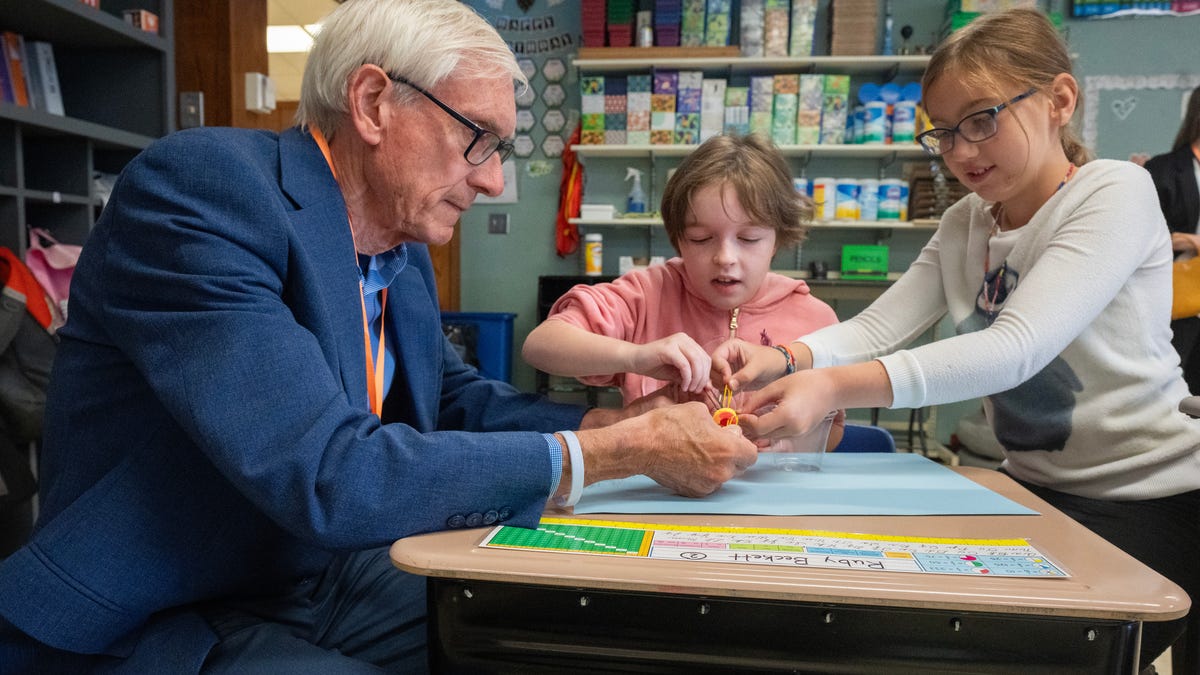
New MPS superintendent Brenda Cassellius lunches with students
New MPS superintendent Brenda Cassellius has lunch with students from Bethune Academy in Milwaukee on Monday, March 17, 2025.
Wisconsin has enacted a new law requiring school districts to create policies banning student cell phone use during class.Many districts, including Milwaukee Public Schools, already have policies restricting phone use, but will now review them for compliance.Some school administrators report that stricter phone policies have already led to improved student engagement and behavior.
Wisconsin’s new statewide cellphone ban is prompting Milwaukee and suburban districts to review their policies, though administrators say many already restrict phone use in classrooms.
Under a bipartisan bill Democratic Gov. Tony Evers signed into law Oct. 31, school boards must adopt policies by July that largely bar students from using their cellphones during instructional time.
The law, which passed the state Senate 29-4 on Oct. 14 and the Assembly 53-45 in February, allows school boards to grant exceptions in emergencies, for educational purposes with a teacher’s permission and for students who need phones to manage health conditions. School district-issued electronic devices are also still allowed.
Even so, the vast majority of public school districts — 90% — already report having a policy similar to what is prescribed in the bill, according to a survey from the state Department of Public Instruction.
State Rep. Joel Kitchens, R-Sturgeon Bay, co-authored the bill, citing the harmful effects of cellphone and social media use on youth mental health.
“Schools already can limit the use of cell phones, but this new law gives them a stronger tool to actually enforce those policies,” he said in a statement. “This is meant to support schools, not limit them.”
Milwaukee Public Schools first implemented a districtwide ban in 2007 after a fight on school grounds raised concerns about students using phones to coordinate altercations with peers and outsiders. The current policy, last revised in 2010, allows students to possess electronic devices during the school day but prohibits their use unless approved for educational purposes.
Enforcement and consequences vary by school, according to policies listed on school websites. Milwaukee Marshall High School confiscates a student’s phone until the end of the day for a first offense, requires a parent pickup after a second offense and issues an automatic suspension for repeat violations. At Rufus King International Middle School, students must store their phones in a vault each morning and retrieve them at dismissal.
MPS School Board President Missy Zombor said in an email that board members will review current policies and procedures with district administrators to ensure they align with the new law.
“We share the concern that state lawmakers and Gov. Evers have expressed through this action,” MPS spokesperson Stephen Davis said in a statement.
In Greenfield, Whitnall School District leaders are similarly determining whether they need to adjust the district’s current policy, a spokesperson said. Middle and high school students may use devices outside of class time “as long as they do not create a distraction or disruption,” while elementary students must store their phones in lockers or school bags.
The Pewaukee School Board approved a policy in October that requires students in grades 4K-8 to power off devices during the school day and store them out of sight. Headphones and earbuds are also prohibited during instructional time and must be stored away unless approved by school staff for educational purposes.
High school students must store their devices with ringers silenced, and may not use them during instructional time. Headphones and earbuds are similarly prohibited during instructional time unless approved by school staff.
In June, the Wauwatosa School Board changed its policy to prohibit students from using devices during school hours and to encourage students to leave devices at home. If students bring devices to school, they must store them in their locker or a cell phone locker.
Administrators at Grafton, Mukwonago Area and Shorewood school districts previously told the Milwaukee Journal Sentinel they updated their policies before the start of the 2024-25 school year to restrict students’ phone access during class.
Grafton High School and Shorewood High School require students to put their phones in caddies when they enter classrooms. In the Mukwonago Area School District, the School Board approved changes in June 2024 requiring students to turn off their devices and store them out of sight.
Administrators at the three districts said the revised policies improved classroom behavior, increased student engagement and decreased disciplinary incidents related to cell phones. But some school officials told lawmakers earlier this year that they opposed the bill because it was written too broadly to be effective.
“Limiting cellphones, gaming devices etc. to maintain an effective learning environment is essential in the classroom,” Greg Kabara, Nicolet Union High School District superintendent, wrote in a letter to lawmakers. “While I understand the overall intent of the bill, it seems too broad and less effective than allowing schools local control in regards to wireless devices during the school day.”
Nicolet’s policy prohibits students from keeping their devices on them in classrooms and requires them to store their devices in designated storage when entering a learning space, according to the district’s handbook.
School boards must submit their device policies to the state Department of Public Instruction by Oct. 1, 2026, and notify the agency of any changes annually under the new law.
Reporter Alec Johnson contributed to this article.
Kayla Huynh covers K-12 education, teachers and solutions at the Journal Sentinel. Reach her at khuynh@gannett.com and follow her on X at @_kaylahuynh. All of her work and coverage decisions are overseen solely by Journal Sentinel editors. Kayla’s position receives support from Herb Kohl Philanthropies and contributions to the Journal Sentinel Community-Funded Journalism Project. Help continue this reporting with a tax-deductible donation at jsonline.com/support.

